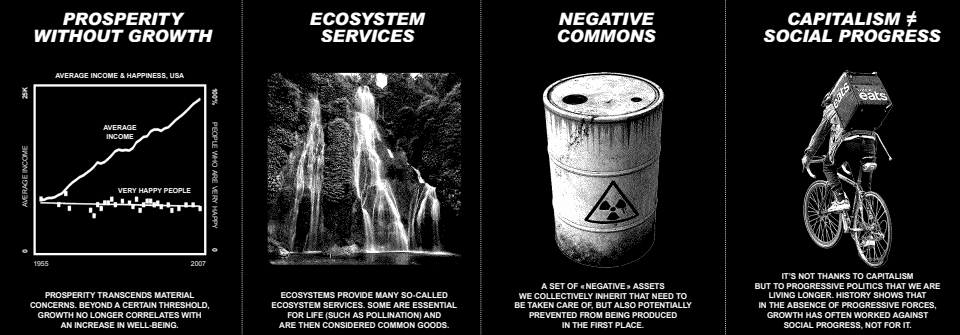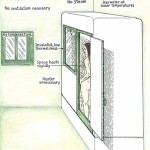- On the efficiency of my scythe.
- Hearts of oak: towards a deep recipe for acorn bread.
- The lost art of traditional bow hunting.
- Female hunters of the early Americas.
- Virgin Hyperloop has invented the world’s crappiest High-Speed Rail.
- Driving the 2021 Cadillac Escalade was one of the most stressful experiences of my life.
- The case against American truck bloat.
- Can we call it a velomobile?
- The Himalayan invention powered by pine needles.
- Trailbridges may have a far broader impact than once thought.
- Elena Kolesnkova: Voskhod Cooperative. [image above]
- Off-the-grid.
No Tech Reader #26
This Website is Designed to Last
“My proposal is seven unconventional guidelines in how we handle websites designed to be informative, to make them easy to maintain and preserve. The guiding intention is that the maintainer will try to keep the website up for at least 10 years, maybe even 20 or 30 years. These are not controversial views necessarily, but are aspirations that are not mainstream—a manifesto for a long-lasting website.”
Read more: A Manifesto for Preserving Content on the Web, Jeff Huang.
See also: A clean start for the web, Tom MacWright.
The Smart Wife: Why Siri, Alexa, and Other Smart Home Devices Need a Feminist Reboot
In The Smart Wife: Why Siri, Alexa, and Other Smart Home Devices Need a Feminist Reboot, Yolande Strengers and Jenny Kennedy examine the emergence of digital devices that carry out “wifework”–domestic responsibilities that have traditionally fallen to (human) wives. They show that the principal prototype for these virtual helpers–designed in male-dominated industries–is the 1950s housewife: white, middle class, heteronormative, and nurturing, with a spick-and-span home. It’s time, they say, to give the Smart Wife a reboot.
Post Growth Toolkit
Post Growth Toolkit [The Game] is an invitation to reprogram ourselves out of the economic growth orthodoxy. It proposes to literally reshuffle our world-views through a compilation of stories, concepts and tactics in order to stimulate new modes of understanding in the context of current environmental crises. It takes the form of a tactical card game inviting players to explore a number of key notions to facilitate collective debate.
Frugal Innovation for Global Surgery
Limited or inconsistent access to necessary resources creates many challenges for delivering quality medical care in low- and middle-income countries. These include funding and revenue, skilled clinical and allied health professionals, administrative expertise, reliable community infrastructure (eg water, electricity), functioning capital equipment and sufficient surgical supplies. Despite these challenges, some surgical care providers manage to provide cost effective, high quality care, offering lessons not only for other low- and middle-income countries but also for high-income countries that are working towards increasing value-based care. Examples would be how to optimise the consumption of resources, and reduce the environmental and public health burden of surgical care.
Owing to the liberal utilisation of capital equipment and single-use supplies, surgical care in high-income countries is increasingly recognised as a significant source of greenhouse gases and other environmental impacts that adversely affect human health. Regulations require many potentially reusable supplies and drugs to be discarded after single use. Supply manufacturers may label drugs or products as single-use to increase profit, reduce liability or facilitate regulatory approval. Many high-income countries struggle to increase the value of care while maximising quality and outcomes, and minimising cost and resource use.
For most high-income countries, cataract surgery is the highest volume and most expensive surgical procedure (in aggregate) in all of medicine. Studies analysing global cataract care found few differences in outcomes, such as surgical infection, despite large differences in carbon footprint and cost. A single cataract procedure in the UK emits an estimated 180kg CO2e (carbon dioxide equivalents) whereas the same surgery with similar outcomes in India emits only 6kg CO2e, 5% of that in the UK.
Source: Steyn, A., et al. “Frugal innovation for global surgery: leveraging lessons from low-and middle-income countries to optimise resource use and promote value-based care.” The Bulletin of the Royal College of Surgeons of England 102.5 (2020): 198-200. [open access]
The Truth Is Paywalled But The Lies Are Free
Quoted from Current Affairs:
To see just how much human potential is being squandered by having knowledge dispensed by the “free market,” let us briefly picture what “totally democratic and accessible knowledge” would look like. Let’s imagine that instead of having to use privatized research services, there was a single public search database containing every newspaper article, every magazine article, every academic journal article, every court record, every government document, every website, every piece of software, every film, song, photograph, television show, and video clip, and every book in existence.
The content of the Wayback Machine, all of the newspaper archives, Google Books, Getty Images, Project Gutenberg, Spotify, the Library of Congress, everything in WestLaw and Lexis, all of it, every piece of it accessible instantly in full, and with a search function designed to be as simple as possible and allow you to quickly narrow down what you are looking for. (e.g. “Give me: all Massachusetts newspaper articles, books published in Boston, and government documents that mention William Lloyd Garrison and were published from 1860 to 1865.”) The true universal search, uncorrupted by paid advertising. Within a second, you could bring up an entire PDF of any book. Within two seconds, you could search the full contents of that book.
Let us imagine just how much time would be saved in this informational utopia. Do I want minute 15 of the 1962 Czechoslovak film Man in Outer Space? Four seconds from my thought until it begins. Do I want page 17 of the Daily Mirror from 1985? Even less time. Every public Defense Department document concerning Vietnam from the Eisenhower administration? Page 150 of Frank Capra’s autobiography? Page 400 of an economics textbook from 1995? All in front of me, in full, in less than the length of time it takes to type this sentence. How much faster would research be in such a situation? How much more could be accomplished if knowledge were not fragmented and in the possession of a thousand private gatekeepers?
Read more: The Truth Is Paywalled But The Lies Are Free, Nathan J. Robinson, Current Affairs, August 2020. Via Ran Prieur.







